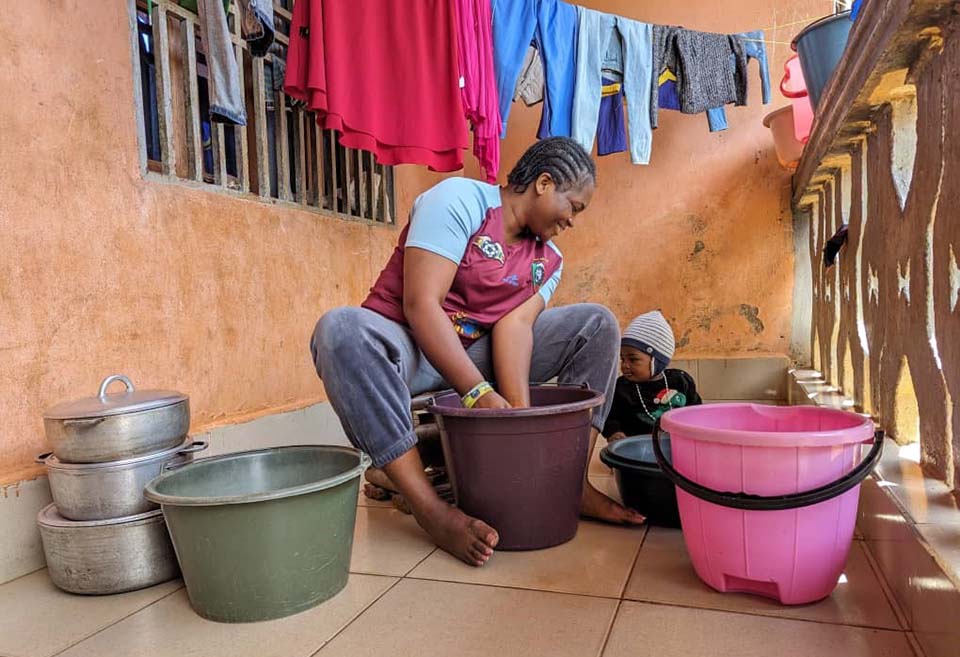
Caring for Cameroon’s Displaced
For many years, Adeline Nayah Tim had been running a successful business as a seamstress in Abo, a remote village in the Boyo subdivision of the northwest region of Cameroon.
But in June 2023, her family’s home was burned down during an armed conflict. Adeline, along with her husband and relatives, were forced to flee to the regional capital, Bamenda. They left everything behind, including her sewing materials.
Like many other residents in the northwest region, Adeline has suffered the negative repercussions of ongoing conflict that has affected Cameroon’s Anglophone regions since 2016. Since then, many families have left their homes and communities and to seek safety elsewhere.

Adeline Nayah Tim, who was displaced by conflict, washes her family's clothes using buckets and soap she received as part of CRS' ACER IV project in northwestern Cameroon.
Photo by Emmanuel Joko/Caritas for CRS
“We lived with a relative when we came to Bamenda in June,” she says. “It was very difficult for all of us. Even getting enough food was a problem, especially as my husband and I were jobless.”
Then, a team from Catholic Relief Services’ Anglophone Crisis Emergency Response project, or ACER project, registered more than 100 recently displaced families in the Bamenda area. Adeline enrolled as a participant. As part of the project, she received electronic vouchers that could be redeemed for critical food and non-food items, like clothes, sanitary products and cookware, to help provide some immediate relief.
“I am a little bit more at ease, as I do not have to worry about food,” Adeline says. “I am confident that by the time my supply will be running out, I will have found a job.”
CRS, in collaboration with the Archdiocese of Bamenda, and with funding from the U.S. Agency for International Development, have been helping families like Adeline’s through the ACER project since 2020, providing access to food and critical household items for 10,800 people who have fled violence or welcomed vulnerable families into their homes.
One such individual who’s been assisting vulnerable families in the Nkwen neighborhood of Bamenda is Paul Akemngwa, the head of the community. The neighborhood received a wave of families seeking refuge in early 2023 and he witnessed the struggles that these families faced.
“I experienced the desperation of some of the families,” Paul says. “When they just arrived, I supported some with food when I could. Some did not even have a place to stay, let alone something to eat.”
Adeline says she is grateful for the support she’s received from the ACER project, and she is quite optimistic about the future. As soon as she saves enough money, she plans to set up her tailoring workshop within the Mile 5 area of Bamenda’s Nkwen neighborhood.
“I am seeing this as an opportunity to restart my life and build from scratch,” Adeline says. “I know it will be hard, but I am ready for the challenge.”
Funded by the U.S. Agency for International Development’s Bureau for Humanitarian Assistance and implemented by CRS in collaboration with the Archdiocese of Bamenda, the Anglophone Crisis Emergency Response IV project is responding to the basic needs of 10,800 individuals from vulnerable internally displaced persons and host families in 19 communities affected by the ongoing crisis in Cameroon’s English-speaking regions. Between April 1 and November 1, 2023, households received three rounds of monthly food assistance and a one-time credit to purchase household supplies. Over 100 households also received training on basic poultry raising and business skills to launch poultry-raising activities to help them become more self-sufficient. Over the past four years, CRS, and the Archdiocese have provided emergency assistance to more than 100,000 people in the northwest region of Cameroon thanks to funds from USAID’ Bureau for Humanitarian Assistance .

